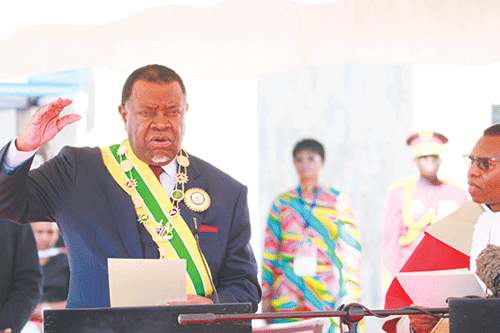President Hage Geingob yesterday reiterated the call for Namibia’s income level by the World Bank to be reclassified, saying the current classification as an upper middle-income country is insensitive to distortions created by the unequal distribution of resources.
Speaking in Doha at the second Qatar Economic Forum, Geingob emphasised that Namibia cannot address the triple challenges of poverty, inequality and unemployment if these inaccurate classifications are left unchallenged.
The President highlighted that the current classification has serious implications for Namibia’s access to affordable debt financing and grants.
The current classification methodology was developed by international financial institutions, such as the World Bank and the International Monetary Fund, and was subsequently adopted by the United Nations.
“This arbitrarily takes our Gross Domestic Product (GDP) and divides it by our small population, thereby arriving at a high per capita income,” Geingob reiterated yesterday in Doha.
Geingob is in Qatar to promote Namibia as an attractive investment destination and encourage uptake in the green energy ambitions like Green Hydrogen. He assured potential investors that the country has a sound governance structure, based on processes, systems and institutions.
This, he said, ensures investors’ interests are safe and protected in accordance with the law.
He added that when examining how societies are faring in terms of socio-economic well-being, multidimensional factors should be taken into consideration, such as social mobility, gender equality, access to basic services that sustain lives as well as access to technology.
The President further told the attending delegation in Doha that Namibia’s key developmental focus has been to break the unbearable cycles of poverty, inequality and high unemployment.
Geingob continued that the ongoing global economic meltdown, exacerbated by Covid-19, is placing unrelenting pressure on developing countries, including Namibia, and has resulted in major reversals in the fight against inequality.
To remedy this catastrophic situation, Geingob urged that a solutions-oriented mindset must be developed with urgency to work through established multilateral forums such as the United Nations.
He further advised countries to employ multiple strategies to reduce inequality and poverty: “These strategies include the promotion of sustainable investments in the economy, while at the same time rolling out comprehensive social safety nets, improved access to safe and clean drinking water, access to energy, universal access to primary and secondary education as well as gender parity”.
An 11-member Business Rescue Task Force (BRTF), appointed by the President, in April this year presented a final report to Geingob in which they stated that while some gains have been made in fighting income inequality in Namibia, a lot of work remains to be done in this regard.
According to the task force, the growth of previously disadvantaged Namibians is still at a vulnerable and fledging stage.
Meanwhile, the country remains one of the most skewed economies in the world with respect to unequal distribution of wealth.
According to the World Bank Wealth Inequality Index, Namibia ranks number two on the top ten list, second to South Africa since 2015 as one of the countries with the highest wealth inequalities in the world, with a Gini coefficient of 59.1%.
The Gini coefficient is a statistical measure of inequality that describes how equal or unequal income, or wealth is distributed among a national population.
Green focus
The second of the President’s speech in Doha yesterday focussed on Namibia’s prospects of becoming an African energy superpower.
Due to world-class renewable energy resources, such as solar and wind, Namibia last year embarked on the promotion and development of a Green Hydrogen sector and an ammonia industry.
President Geingob stated Namibia attracted investment proposals to the tune of US$9 billion, and the country is currently in the final stages of negotiations with the preferred bidder to conclude the investment compact.
It is expected this investment by Hyphen Energy will produce five gigawatts of green energy, and two million tonnes of ammonia and would create significant employment opportunities for Namibians.
This, alone, Geingob stated, would go a long way in addressing inequality.
“Jointly, with some of our development partners, we are investing in hydrogen pilot projects, including the first hydrogen service station,” Geingob stated.
– mndjavera@nepc.com.na



